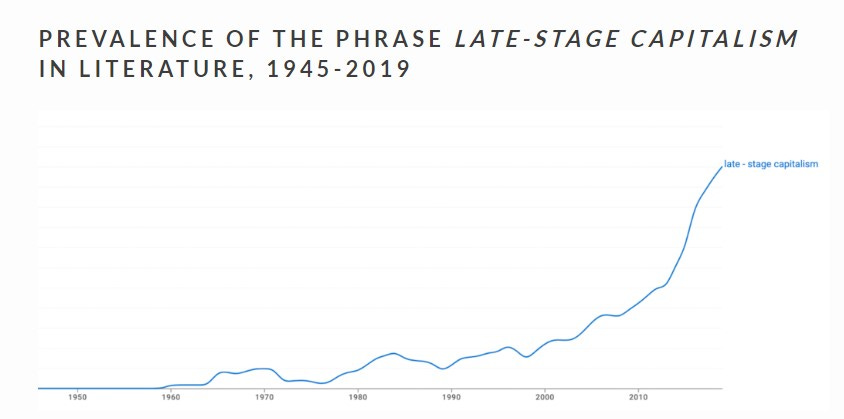Late-Stage Capitalism Is Not Real
Just another Marxist theory...
Recently, social media comments have been unearthed by the current CEO of NPR (apparently she has over 20K tweets). In one tweet she said she was sick of late-stage capitalism (or late capitalism). Countless activist journalists say the same thing: “Late-stage capitalism is such a drag.“
The situation here is quite irritating, primarily because many of the anti-captialist’s found in the US are people who have benefited from capitalism (affluent, educated, urban-suburban types). In the case of the hyper- woke, virtue signalling braggart and new NPR CEO, her father worked for Goldman Sachs. Quite the dichotomy.
The thing is, late-stage capitalism is not a real thing, it is simply a Marxist theory. And while Marx did not coin the term “late capitalism” (it was coined by Werner Sombart), Marxism heavily influenced the term.
Werner Sombart, a German economist, used it (the term: Late-Stage Capitalism) to describe the stage of capitalism that followed the Industrial Revolution. He saw it as a system marked by the rise of big business, the concentration of wealth, and the exploitation of workers. The LC framing gained traction, at least among Marxist theorists, after World War I with believers pointing to increasing inequality, environmental degradation, and social unrest as evidence of capitalism’s imminent collapse and demise.
-Instead of ‘Late Capitalism,’ Maybe the US Economy Is Still in ‘Early Capitalism’Sombart’s main contribution was to define three periods of the capitalist economic system: early or proto capitalism, advanced capitalism and late capitalism. In Sombart’s analysis, late capitalism referred specifically to economic, political and social deprivations associated with the aftermath of the first world war.
- We live in a time of ‘late capitalism’. But what does that mean? And what’s so late about it?Belgian Marxist Ernest Mandel popularized the term “late capitalism” to describe the way the system had changed in the postwar decades. Mandel was considered one of the most dangerous intellectuals in the world. Countries such as Australia, France, Switzerland, the United States, and West Germany officially barred him from entering. Jacobin
In America, the de facto home of capitalism, I would have to say that we are in the “early stages” of capitalism, based on our country’s history. This makes for an interesting argument, because we probably have the biggest business cycles in the free world, and we definitely are the most innovative, so there are bound to be really big booms and busts, continually.
Regardless, here is the reality: Capitalism is cyclical. There are periods of crisis and change, and adjustments. Capitalism is also flexible. There are technologies, ideas, and reforms. Adaptations. Capitalism also creates wealth, and that has led to serious global benefits, and while there are still inequalities (which will always exist), poverty rates around the world have been going down, lifespans are getting longer, and people are living great lives.
Let’s take a look at our capital markets. These are driven by economic fundamentals which are rooted in capitalism / free markets. Our stock market is the envy of the world. So is our futures and fixed income markets. However, as we often go through cyclical cycles, Marxists use economic downturns as examples of “late-stage capitalism.”
Marxists have long expected a revolution brought on by the failure of capitalism, which would then usher in the epoch of late-stage capitalism. In essence, this is what they hope for - whether they know it or not - when they discuss late-stage capitalism or late capitalism. This is one of the reasons Marxists always look to stir up “revolutions." A self-fulfilling prophecy.
Recently, Marxists have pointed to crime waves - which are a result of “soft on crime policies” - as a sign of capitalism failing, and therefore stating that we are entering late-stage capitalism. Nevermind the obvious fact that the increase in crime has been brought on by progressive criminal reform policies dominating major Western cities (NYC, LA, London, Paris, etc.)
If the leftists had their way, what would replace capitalism? Most likely socialism, or communism. Ironically, the US has many elements of a (capitalistic) mixed economy: A blending of capitalism and social welfare. There's a fusion of private property ownership and governmental intervention and oversight, but the government is also involved in tasks such as regulation, taxation, social welfare initiatives, and providing public services.
This mixed system that we have appeases the left and the right in many ways. Take Medicare as an example, the US healthcare system for those over 65. The average pay into the Medicare system is around $200K and the average cost per person is around $750K. Social Security is another example. Both these programs are *largely* subsidized by the government.
Still, the left pushes for more socialism (more social spending, more diversity mandates, more subsidies, etc.) and the right pushes for more market based realities (deregulation, less diversity mandates, less subsidies, etc.).
It is important to note that - globally - the only advanced “free market” countries discussing sliding into advanced socialism and communism are also the wealthiest (select European countries and parts of America). Most all others countries in the world - not currently under the thumb of socialism / communism - are sliding into capitalism.
As it’s commonly used, the phrase late-stage capitalism is also a bad explanation, since the person using it can make infinite variations if their theory turns out to be incorrect. No matter what happens, they can always claim we are in a late stage of capitalism, and that if we wait just a bit longer, they’ll be proven correct. Moreso, if some unpredictable event were to lead to the end of capitalism, they would take credit for their prediction, even though their prediction was the result of random luck.
- Crushing The Myth of Late-Stage Capitalism
So next time you hear someone say ‘late-stage capitalism,” realize they are just espousing their ecclesiastical beliefs from the church of Marxism.
*When I say Marxists, I also mean progressives, leftists, communists, socialist's, etc.




